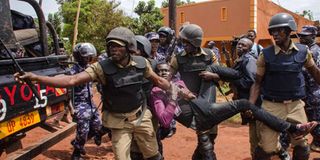Premium
Uganda killings will define Museveni’s legacy

Police officers arrest a supporter of Ugandan musician turned politician Robert Kyagulanyi, commonly known as Bobi Wine, before his arrest on his way to a press conference held to announce the cancellation of his show at Busabala, Uganda, on April 22, 2019.
What you need to know:
- The violence meted out on supporters of presidential candidate Robert Kyagulanyi was shocking.
- Mr Besigye gave up his ambitions and Bobi Wine stepped in.
It is not unusual for the government of President Yoweri Museveni to routinely remind its citizens and visitors just who is in power – the army.
And it is also common that citizens, and especially opposition leaders, are beaten up and locked up to remind them power solidly rests with the National Resistance Movement and, specifically, its leader.
But the violence meted out last week primarily on supporters of presidential candidate Robert Kyagulanyi (popularly known as Bobi Wine), was shocking. Live bullets were rained on protesters, leaving scores dead and many others injured.
But more chilling was a video clip on social media of an incensed, almost incoherent president yelling – “they have no right to abuse me, we will crush those criminals”. It was a warning that there may well be more bodies in the coming days and lead up to the elections.
President Museveni has long shed off any pretense he may have had to being a democrat. He may have used revolutionary rhetoric to justify his involvement in the wars against Idi Amin in the 1970s and against Milton Obote that saw his ascent to power in 1986.
Progressive leader
Over the years, he has transformed from an apparently progressive leader keen to allow some form of democracy to flourish and has become a shameless dictator himself.
He conveniently dismisses his earlier opposition to African presidents staying in power for too long and now believes only he has the capacity to maintain peace and security in Uganda.
This is a fallacy because that peace and security rests on an intense intolerance to any overt attempts to threaten his hold on power. Just ask Kizza Besigye, the three-time Forum for Democratic Change (FDC) presidential candidate! He has been battered, brutalised, locked up and harassed like few others.
Mr Besigye gave up his ambitions and Bobi Wine stepped in. The latter, who belongs to the generation that President Museveni calls “his grandchildren”, has captured the imagination of youthful Ugandans that owe President Museveni little loyalty. Seeing themselves as Bobi Wine’s “ghetto followers”, they correctly assign their hopelessness, joblessness and insecurities to the person that has been in power for all their lives!
Robust policies
Under different circumstances, Bobi Wine would probably not be the right person to take over a government that needs to introduce robust policies to revive a flailing economy and reduce endemic poverty, revamp a collapsed health sector and overhaul an education system that is desperately starved of resources and ideas. But the “ghetto president” seems to have struck the right chords with a significant constituency that could well make him an unlikely president. But he will not be allowed.
Just like Tanzania’s President John Magufuli bulldozed his way into State House in the recently ended elections, President Museveni will “win” the elections with a landslide, courtesy of a compliant electoral commission, an efficient party machine and troops that ensure that only those activities that solidify an NRM victory will be encouraged. That may include frustrating opposition areas not to vote.
Uganda and Tanzania now present a case where dictators, having mastered the rhetoric of democracy and controlled the tools of democracy – parliament and the judiciary – have failed to secure the guarantors of democracy, which is generally a reasonably content and secure citizenry.
Few will describe Rwanda’s President Paul Kagame as a democrat. But even fewer will argue with the fact that a very large number of Rwandese citizens do genuinely support him, even if part of that is because of fear.
It is true that the state machinery works absolutely in support of the RPF policies and programmes. But they are programmes that have made a profound difference in the peoples’ quality of life.
Winning the last election by 99 per cent of the vote may have been extraordinary, but there is no doubt that President Kagame deserves huge respect and support.
Like any strongman anywhere, he does not tolerate opposition, but he has been very clinical in the way he has handled that challenge. No mass shooting, no histrionics. And his public relations machinery has been exemplary.
Ugandans could arguably have been more tolerant of a Museveni who truly cares for them rather than for himself and the oligarchy he is constructing around himself. He now sits on the cusp of a horrendous legacy.
[email protected], @tmshindi




